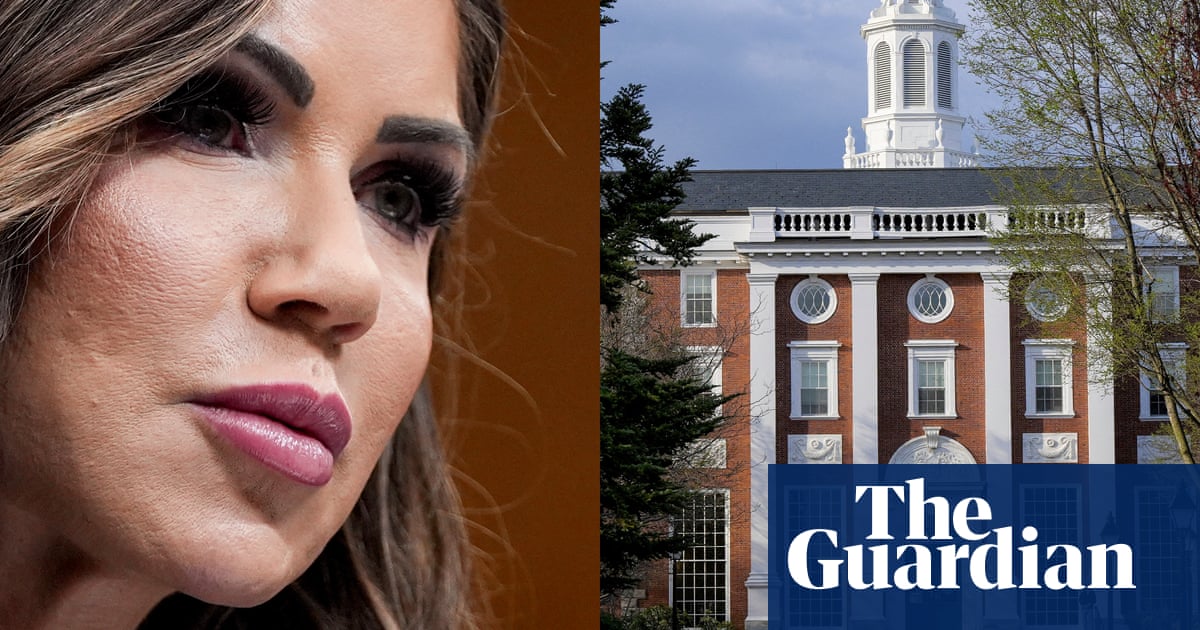Good morning.
The Trump administration has revoked Harvard University’s ability to register international studentsand has ordered current foreign Harvardstudents to transfer or lose their legal status, sendingshockwaves through academia.
The Trump administration notified Harvard of its decision after correspondence regarding the “legality of a sprawling records request” – part of a government investigation in which federal officials are threatening the university’s international student admissions.
The homeland security secretary, Kristi Noem, said her department was taking the action owing to Harvard’s “failure to comply” with reporting requirements, adding that the Trump administration will “root out the evils of anti-Americanism and antisemitism in society and campuses”, coming amid the administration’s claims that Harvard has inadequately responded to antisemitism on campus.
How has Harvard responded?A Harvard spokesperson called the government’s action “unlawful” in a statement to the Guardian on Thursday.
The Trump administration ispushing to abolish a requirementstipulating the US government’s responsibility to provide basic rights and protections to child immigrants in its custody.
The protections, which come from a 1997 consent decree called the Flores Settlement Agreement, cap the length of time children can be held by immigration authorities and require the government to provide detained children with adequate food, water and clean clothes.
The administration’s attempt to end these protections echo Trump’s previous effort during his first term, though the motion was struck down.
What is the justice department’s argument?It argued in a court motion on Thursday that the Flores agreement should be “completely” terminated, claiming it has encouraged unauthorised border crossings and stopped the government from “effectively” deporting immigrant families. Rights groups called it “unconscionable”.
Evidence presented by Donald Trump to the South African president, Cyril Ramaphosa, to back up hisfalse claims of a “white genocide” supposedly occurringin his nation included images from the Democratic Republic of Congo.
Rather than depicting dead Afrikaners in South Africa, the images show humanitarian workers carrying body bags in the Congolese city of Goma after battles with Rwanda-backed M23 rebels.
As well as photos taken in a different country, Trump showed Ramaphosa footage that he claimed depicting the “burial sites” of more than a thousand white farmers. Yet, it soon emerged that this was also inaccurate, as it turned out that it showed a temporary memorial site, set up after the murder of two Afrikaner farmers locally.
What’s the context for Trump’s claims?While murder and violent crime rates are high in South Africa, the idea of a genocide against white South Africans is a far-right conspiracy theory: the majority of victims are Black, as Ramaphosa pointed out.
Israel has accusedCanada, the UKand France of “emboldening Hamas”,after the country’s leaders called on Israelto stop its military offensive and allow humanitarian aid to enter Gaza.
Venezuela’s decision to hold elections to choose officials to run an area of internationally recognised Guyanese territoryis an assault on the country’s sovereignty,Guyana’s president has warned.
Columbia graduate and detained Palestinian activistMahmoud Khalilwas finally allowed to hold his babyfor the first time,one month after he was born.
Conflict, violence, the climate emergency and natural disasters, have forced a record 83.4 million people to become refugees within their own nations.Three internally displaced peoplein Bangladesh, Sudan and Colombia explain how floods, civil war and clashes between the military and paramilitary groups forced them to flee their homes. “Local people don’t want us here … We don’t want to be here either – but we have no choice,” said a woman with four children living in a tent in a Bogotá park.
In Cameron county, on the southern tip of Texas, the world’s richest man has built Starbase,the home of his mission to “save’ humanity and colonise Mars, complete with a bronze bust in his own image. But as its population of 280 – most employed by Musk – prepared to vote on whether to incorporate it as a new municipality, others living near the base were divided over the billionaire and his plans.
Prosecuting polluters over climate harms is notoriously tricky – a huge number of actors are behind emissions, making it hard to establish legal responsibility, and the worst harms are often not experienced in the same country that the emissions are produced in. But in recent years, judges have woken up to the existential threat of the climate emergency and have begun to allow the interpretation of human rights law to shift to accommodate that.Samira Shackle speaksto some of the pioneers of this change and asks what the impact could be.
Americans come first andBritish people second when it comes to how often they swear online, while Australians are in third place, vital new research has found. But while people from the US and UK are ahead in terms of sheer volume of curse words used, Australians were more likely to use uncommon and unique swears, with the researchers noting that vulgar language is a “natural playground” for unleashing “linguistic creativity”.
First Thing is delivered to thousands of inboxes every weekday. If you’re not already signed up,subscribe now.
If you have any questions or comments about any of our newsletters please emailnewsletters@theguardian.com
